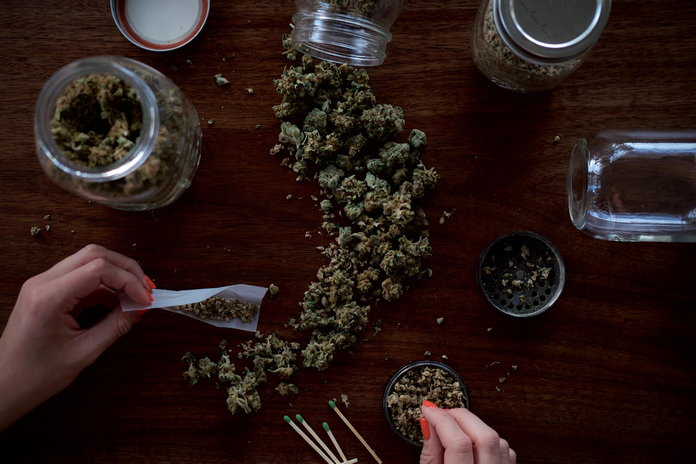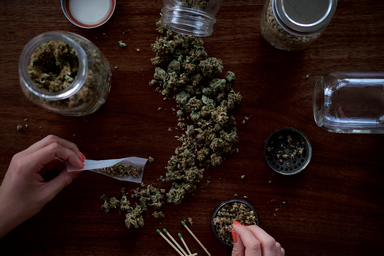In Canada, where marijuana use is now legalized, dispensaries selling weed products are popping up everywhere. In downtown Toronto, dispensaries seem to even outnumber LCBOs! With this new wave of legal consumption, it is important to know how weed affects your body and mind in the short and long term — especially with how it is glamorized on social media.
In particular, TikTok trends and sounds around the phenomena of being ‘high’ after smoking weed are common. Last year for example, TikTok user @mooptopia (who has since been banned on the platform) went viral for her videos featuring her lip syncing to songs with her eyes incredibly bloodshot from weed use. Since then, songs that have lyrics related to weed or even with just the word ‘high’ in them, have been used by creators to show before/after shots of them consuming weed, and tend to go viral.
This in itself is not necessarily bad, after all, similar behavior has been shown on TikTok with alcohol consumption. However, audience and creator reaction to critique of marijuana use/abuse is where a large issue lies. I have seen countless creators and commenters justify daily use and dependency of weed by claiming that ‘alcohol is much worse,’ ‘weed is the least harmful drug,’ ‘it’s a plant, it is organic,’ etc. These misconceptions could draw more people into weed abuse. Thus, as I have struggled with a dependency on weed and am surrounded by others that abuse it, I want to share the reality of how this drug can affect you.
- Memory Loss
-
Short term and long term memory can be greatly affected by smoking weed. Weed can cause dissociation and will blur your short term memory during your high. Smoking while in school was almost detrimental to my academic performance — it caused me to forget important details and dates.
Speaking to friends that have smoked for years, I found that most who smoke at night often forget most of their day, even if they were sober for the majority of it. The eight months in which I was a certified ‘stoner’ are mostly a blur, and my family members that are stoners have poor memory overall.
Did you know? Short term memory is transferred into long term memory in your sleep.
- Derealization/Dissociation
-
Smoking weed casts a fog over your mind, and with that comes a disconnect to reality which for some provides an escape. When I was smoking regularly, this fog hovered over me at all times — it felt like I was never present or truly conscious. I was fearful of being sober, preferring the comfort of disconnection over facing the burdens of my life.
Once I took a step back from my consumption and re-introduced clarity, I realized just how much this fog affected me. I had to re-learn who I was in many ways, and what I could do to fill the time aside from being high.
- ‘Greening Out’
-
‘Greening out’ is the term for when you essentially overdose on weed, and your body reacts poorly. I’ve never personally ‘greened out’ (luckily), but I ‘ve seen people vomit, exhibit feverish symptoms, and endure some horrible phantom pains and paranoia. It can be quite dangerous, especially because hallucinatory effects can cause you to believe you’re dying or that someone’s going to harm you.
- Weed ‘Hangovers’
-
Yes, these are a thing. I wish they weren’t, but I can’t count how many times I went and ‘seshed’ with friends, trudged home to throw myself into bed, and woke up feeling disgusting. Waking up after smoking a bit more than your tolerance the following night often results in mental and physical pains.
It’s similar to being woken up a few hours into a ‘nap’— a heaviness settles upon your body and you feel achy, your mouth is probably dry, and grumpiness is imminent. Your ‘waking up’ period takes longer, you sometimes have a headache, and you feel sluggish. I have never once seen a stoner friend wake up looking well-rested — more often than not, they go for a morning bong hit as a picker-upper.
- Withdrawal
-
Marijuana does not have addictive properties, but you can develop a dependency on it. You might feel that it has helped you in some ways, such as by lessening your anxiety or calming your mind, which makes it harder to stop usage. Weed use also tends to stem from social groups, so withdrawing from it can be difficult simply due to social pressures and proximity.
I was drawn to the sensation of inhaling smoke, so in my withdrawal I found myself taking up vaping to keep myself from getting high daily. I wouldn’t recommend this, but my goal was simply to stop getting high because of the poor effects it had on my mental health. As with most drugs, it is easy to relapse into use. I still indulge once a week or so, but sometimes I get wrapped up into it again and find myself smoking three days in a row. Being conscious of your consumption helps ensure your bodily autonomy.
Like most drugs, reactions and effects of weed consumption vary. The listed effects are only a few of the larger ones that I experienced over the time that I was smoking weed regularly — and witness even now with my friends and family that are still abusing the drug.
Despite recent trends on social media and the glamorization of marijuana, it is important to know the effects it can have on you and your body. After all, remember, weed is a drug.
Read more about it here.






